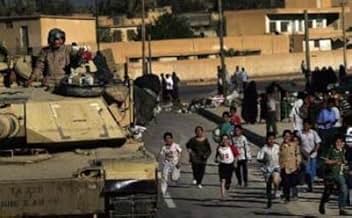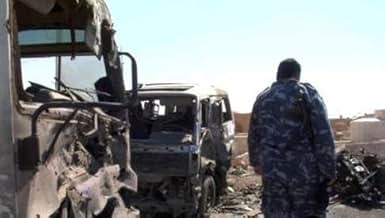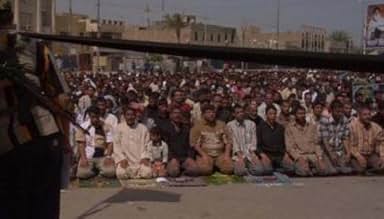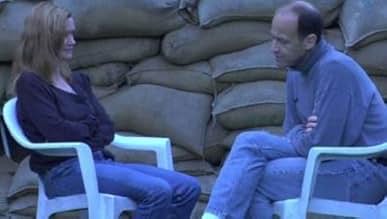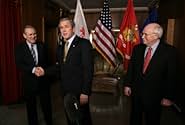AVALIAÇÃO DA IMDb
8,2/10
8,8 mil
SUA AVALIAÇÃO
Adicionar um enredo no seu idiomaA comprehensive look at the Bush Administration's conduct of the Iraq war and its occupation of the country.A comprehensive look at the Bush Administration's conduct of the Iraq war and its occupation of the country.A comprehensive look at the Bush Administration's conduct of the Iraq war and its occupation of the country.
- Indicado a 1 Oscar
- 12 vitórias e 19 indicações no total
Campbell Scott
- Narrator
- (narração)
George Tenet
- Self
- (cenas de arquivo)
Dick Cheney
- Self
- (cenas de arquivo)
Donald Rumsfeld
- Self
- (cenas de arquivo)
Paul Wolfowitz
- Self
- (cenas de arquivo)
Colin Powell
- Self
- (cenas de arquivo)
Feisal Istrabadi
- Self
- (as Faisal Al-Istrabadi)
Ahmad Chalabi
- Self
- (cenas de arquivo)
Avaliações em destaque
It would be nice to think the terrible debacle of the US invasion and occupation of Iraq of 2003 somehow just happened. That it was just a mistake to go there. That things just went wrong. But as this excellent new documentary shows, things went wrong for reasonsbecause of how the war was planned and executed.
Or how it wasn't planned. How ultimately completely unqualified people were left in charge. Here are some of the mistakes that No End in Sight elucidates for us:
1. Nobody knew anything. Out of a basic US cadre of roughly 130 people first sent in to run things, only 5 knew Arabic. Nobody knew from factions. What a Shiite and a Sunni and a Kurd were they found out later. Instead of realizing what leaders would emerge (such as the most popular man in Iraq now, Muqtada Sadr), the neo-cons sent in Ahmed Chalabi, a corrupt exile without credibility or authority, believing he would be the new leader. They didn't know how many troops were required to maintain order, and Rumsfeld, trying to prove a cockeyed theory he had no knowledge to support, chose too few. (Then Army Chief of Staf General Eric Shinseki had pointed this out to the Senate before the war even began.)
2. Nobody, neither Americans nor Iraqis, was designated to maintain order. Chaos reigned. "Stuff happens," said Rumsfeld. No: "stuff" doesn't just happen: it's allowed to happen. As Seth Moulton, a young Marine officer who is one of Ferguson's voices says, "We were Marines. We could have stopped looting." But they were not directed to do so. The troops, already too few, just stood around and watched as Baghdad was torn apart, the national library burned, the national museum looted. All the ministry buildings were dismantled and lootedtellingly, only the Ministry of Petroleum was guarded. Baghdad's water and electricity fell apart, and links with the rest of the country turned into wild and dangerous interzones. Most important of all for the maintenance of order, large caches of arms were unknown to US troopsand insurgents pillaged them.
Iraq was lost in the first week of the occupation. But worse was yet to come. And worse. And worse. A key moment was the replacement of ORHA, The Office for Reconstruction and Humanitarian Assistance (ORHA), headed by Jay Garner, which was not allowed to protect any of its sites, by the CPA, the Coalition Provisional Authority, headed by the arrogant Paul Bremer.
3. This is when the US destroyed the country's human infrastructure, and in so doing sowed the seeds of insurgency and civil war. The occupation fired the entire Iraqi standing army, half a million officers and men alike, and dismissed and barred from work 50,000 "Baathist" government officials and employees. Rendering all these people unemployed dealt a huge economic blow to the country in itself. But far worse than that, it led to permanent conflictultimately to civil war. It created many enemies, and it left no one to work with. At this point the goodwill the Americans had won by toppling the despotic regime of Saddam Hussein was lost. The violence and lawlessness that had been allowed to proceed unchecked began to become organized. Began to have a cause.
4. Many of the Americans sent in to help with occupation and reconstruction had nothing to work with. Ambassador Barbara Bodine (in charge of Baghdad in spring 2003) arrived to find offices supplied to her and her staff that were empty rooms with no computers, not even telephones. But as she says on screen, it didn't matter because they had no phone listsand no one to call.
Nir Rosen is one of the most knowledgeable and independent American journalists in Iraq and a producer and talking head of this film. As he has recently said, Iraq today, four and a half years later, is a region of city-states, a source of instability to the whole area, to Syria, Jordan, Lebanon, Israel, Iran, even perhaps to Egypt. Pacifying and controlling Baghdad no longer means anything because Baghdad doesn't control the countryif you can call it a country. The US forces are just another militia, the most hated but not the most effective.
First-time director Charles Ferguson gives us the various figures, the cold facts, the cost, the numbers of dead and wounded. But what most matters is what people have to say, and Ferguson has assembled some key talking heads. These include former Secretary of State Richard Armitage, Ambassador Bodine, Colin Powell's former chief of staff Col. Lawrence Wilkerson, Col. James Hodges, soon-replaced Iraq viceroy Jay Garner (who like others strenuously objected to the dismissal of the army and the debathification, but was ignored by his replacement, Paul Bremer), Bremer adviser Walter Slocombe, frustrated ORHA functionary Paul Hughes, and other diplomats, journalists, officers, and enlisted personnel who were there in Iraq after the invasion.
Ferguson has a doctorate from MIT, where he has taught; is a member of the Council on Foreign Relations and the Brookings Institution (he's an insider!); and has authored three books on information technology. His approach is analytical. The basic problem was that the usual suspectsBush, Cheney, Rumsfeld, & Co.had spent virtually no time on planning the aftermath of "Shock and Awe"--the occupation. It was all planned, skimpily, at the last minute, deliberately ignoring all the experts' advice.
No End in Sight is not so much an indictment or a polemic or a proposal as a post-mortem. Its aim is to lay out the whole devolution process that took place under US control of Iraq. Never mind the run-up to the war, the justifications, the aims. Here is the story that shows the situation might have been handled better. Things are much worse.
We get to see a lot of political documentaries now so we have learned to judge them. This is a very fine oneand for Americans an essential one.
Or how it wasn't planned. How ultimately completely unqualified people were left in charge. Here are some of the mistakes that No End in Sight elucidates for us:
1. Nobody knew anything. Out of a basic US cadre of roughly 130 people first sent in to run things, only 5 knew Arabic. Nobody knew from factions. What a Shiite and a Sunni and a Kurd were they found out later. Instead of realizing what leaders would emerge (such as the most popular man in Iraq now, Muqtada Sadr), the neo-cons sent in Ahmed Chalabi, a corrupt exile without credibility or authority, believing he would be the new leader. They didn't know how many troops were required to maintain order, and Rumsfeld, trying to prove a cockeyed theory he had no knowledge to support, chose too few. (Then Army Chief of Staf General Eric Shinseki had pointed this out to the Senate before the war even began.)
2. Nobody, neither Americans nor Iraqis, was designated to maintain order. Chaos reigned. "Stuff happens," said Rumsfeld. No: "stuff" doesn't just happen: it's allowed to happen. As Seth Moulton, a young Marine officer who is one of Ferguson's voices says, "We were Marines. We could have stopped looting." But they were not directed to do so. The troops, already too few, just stood around and watched as Baghdad was torn apart, the national library burned, the national museum looted. All the ministry buildings were dismantled and lootedtellingly, only the Ministry of Petroleum was guarded. Baghdad's water and electricity fell apart, and links with the rest of the country turned into wild and dangerous interzones. Most important of all for the maintenance of order, large caches of arms were unknown to US troopsand insurgents pillaged them.
Iraq was lost in the first week of the occupation. But worse was yet to come. And worse. And worse. A key moment was the replacement of ORHA, The Office for Reconstruction and Humanitarian Assistance (ORHA), headed by Jay Garner, which was not allowed to protect any of its sites, by the CPA, the Coalition Provisional Authority, headed by the arrogant Paul Bremer.
3. This is when the US destroyed the country's human infrastructure, and in so doing sowed the seeds of insurgency and civil war. The occupation fired the entire Iraqi standing army, half a million officers and men alike, and dismissed and barred from work 50,000 "Baathist" government officials and employees. Rendering all these people unemployed dealt a huge economic blow to the country in itself. But far worse than that, it led to permanent conflictultimately to civil war. It created many enemies, and it left no one to work with. At this point the goodwill the Americans had won by toppling the despotic regime of Saddam Hussein was lost. The violence and lawlessness that had been allowed to proceed unchecked began to become organized. Began to have a cause.
4. Many of the Americans sent in to help with occupation and reconstruction had nothing to work with. Ambassador Barbara Bodine (in charge of Baghdad in spring 2003) arrived to find offices supplied to her and her staff that were empty rooms with no computers, not even telephones. But as she says on screen, it didn't matter because they had no phone listsand no one to call.
Nir Rosen is one of the most knowledgeable and independent American journalists in Iraq and a producer and talking head of this film. As he has recently said, Iraq today, four and a half years later, is a region of city-states, a source of instability to the whole area, to Syria, Jordan, Lebanon, Israel, Iran, even perhaps to Egypt. Pacifying and controlling Baghdad no longer means anything because Baghdad doesn't control the countryif you can call it a country. The US forces are just another militia, the most hated but not the most effective.
First-time director Charles Ferguson gives us the various figures, the cold facts, the cost, the numbers of dead and wounded. But what most matters is what people have to say, and Ferguson has assembled some key talking heads. These include former Secretary of State Richard Armitage, Ambassador Bodine, Colin Powell's former chief of staff Col. Lawrence Wilkerson, Col. James Hodges, soon-replaced Iraq viceroy Jay Garner (who like others strenuously objected to the dismissal of the army and the debathification, but was ignored by his replacement, Paul Bremer), Bremer adviser Walter Slocombe, frustrated ORHA functionary Paul Hughes, and other diplomats, journalists, officers, and enlisted personnel who were there in Iraq after the invasion.
Ferguson has a doctorate from MIT, where he has taught; is a member of the Council on Foreign Relations and the Brookings Institution (he's an insider!); and has authored three books on information technology. His approach is analytical. The basic problem was that the usual suspectsBush, Cheney, Rumsfeld, & Co.had spent virtually no time on planning the aftermath of "Shock and Awe"--the occupation. It was all planned, skimpily, at the last minute, deliberately ignoring all the experts' advice.
No End in Sight is not so much an indictment or a polemic or a proposal as a post-mortem. Its aim is to lay out the whole devolution process that took place under US control of Iraq. Never mind the run-up to the war, the justifications, the aims. Here is the story that shows the situation might have been handled better. Things are much worse.
We get to see a lot of political documentaries now so we have learned to judge them. This is a very fine oneand for Americans an essential one.
You may think that Charles Ferguson's documentary is filled with things we already know. That's what I thought. But the truth of the matter is I knew it like a rumor of sorts born and nurtured out of anger and frustration. What this riveting documentary does is to show it to us confirming what we thought we knew.The sadness is unbearable. The clarity of what lays at the center of this absurdity is startling, devastating. There were only five people in the theater. Why? I found out about the existence of "No End In Sight" through a radio interview with the film-maker. The film has been released practically in secrecy. Everyone is flocking to see Chuck and Larry while this masterpiece that concern us directly is practically ignored. I want to thank Charles Ferguson for this enormous contribution to the truth. I believe he put his own livelihood on the line for the privilege. Sir, you've just become a hero of mine.
10sdv30-1
This is a movie every American must see. Tens of thousands of Iraqis killed, thousands of brave American soldiers killed or maimed, all for no apparent reason than the arrogance of this administration. Many good people, administrators, military etc. speak out in this movie and give a chilling view of the ineptitude and arrogance of George Bush and co. Unfortunately, these people were not consulted in the beginning of the occupation. Instead, they were pushed aside, as clueless and even malevolent bureaucrats, such as Bremmer, Holcombe, Wolfowitz, Rice, Rumsfeld, Cheney and Bush, mangled every aspect of the American occupation, one after the other, causing in the process an unimaginable loss of human life and resources. The movie's creators do not impose their beliefs on you. Instead, they let the testimonies of the people who were there speak for themselves. The conclusion that comes out of it is inescapable. This has been the largest quagmire in American history, the true cost of which will not be known for decades. It truly is a nightmare with no end in sight.
This is an amazing conformation of the Bush administrations utter failure in the handling of the Iraq war. A girl scoot troop could have made better and more informed decisions. Perhaps even a troop of monkeys would have done a better job then Bush's henchmen?
The errors in judgment and lack of military experience within the administration are both appalling and telling of the Bush white house. Every military expert was systematically ignored or sidelined. It's as if the Bush administration's primary and sole interest or concern was the protection and acquisition of Iraq's oil provisions.
This film is a testament to the complete and absolute failure of the Bush presidency.
The errors in judgment and lack of military experience within the administration are both appalling and telling of the Bush white house. Every military expert was systematically ignored or sidelined. It's as if the Bush administration's primary and sole interest or concern was the protection and acquisition of Iraq's oil provisions.
This film is a testament to the complete and absolute failure of the Bush presidency.
It cannot be disputed that all that is presented here is factual, being that it consists of interviews and documentary footage. There may be some debate as to the truth of what some of the interviewees say, but the interviews did take place and those being interviewed are clearly identified. The material is edited to conclusively establish that the U.S. Iraq adventure is a monument to incompetence. The fact that most of the interviewees were high ranking officials in the Bush administration lends credence to the point of view.
To those who have diligently tried to follow the events of the Iraq war, this film will confirm suspicions as well as add some new insights as to how we have wound up in the mess we are in. To those who have not paid attention, this film should provide groundwork for further investigation. The film avoids sensationalism - it does not dwell on maimed bodies, casualties, troop morale, and so forth. It does not even cite things like Bush's "Mission Accomplished" speech or Wolfowitz's estimate the the cost of the war would be two billion dollars tops.
It is not surprising that all of the principal players declined to be interviewed, but it would have been good to have had interviews with officials who supported going to war and continue to defend it.
What I was left with after viewing this was a great sadness that after well over a year since this film was released, and after over five years of the war, there is still no end in sight.
To those who have diligently tried to follow the events of the Iraq war, this film will confirm suspicions as well as add some new insights as to how we have wound up in the mess we are in. To those who have not paid attention, this film should provide groundwork for further investigation. The film avoids sensationalism - it does not dwell on maimed bodies, casualties, troop morale, and so forth. It does not even cite things like Bush's "Mission Accomplished" speech or Wolfowitz's estimate the the cost of the war would be two billion dollars tops.
It is not surprising that all of the principal players declined to be interviewed, but it would have been good to have had interviews with officials who supported going to war and continue to defend it.
What I was left with after viewing this was a great sadness that after well over a year since this film was released, and after over five years of the war, there is still no end in sight.
Você sabia?
- CuriosidadesMarine Lieutenant Seth Moulton was elected the US Congressman for Massachusetts' 6th District in November 2014.
- Citações
Seth Moulton: Are you telling me that's the best America can do?... No, don't tell me that... That makes me angry.
Principais escolhas
Faça login para avaliar e ver a lista de recomendações personalizadas
- How long is No End in Sight?Fornecido pela Alexa
Detalhes
Bilheteria
- Orçamento
- US$ 2.000.000 (estimativa)
- Faturamento bruto nos EUA e Canadá
- US$ 1.433.319
- Fim de semana de estreia nos EUA e Canadá
- US$ 31.533
- 29 de jul. de 2007
- Faturamento bruto mundial
- US$ 1.433.319
- Tempo de duração1 hora 42 minutos
- Cor
- Mixagem de som
- Proporção
- 1.85 : 1
Contribua para esta página
Sugerir uma alteração ou adicionar conteúdo ausente

Principal brecha
By what name was Sem Fim à Vista (2007) officially released in India in English?
Responda

